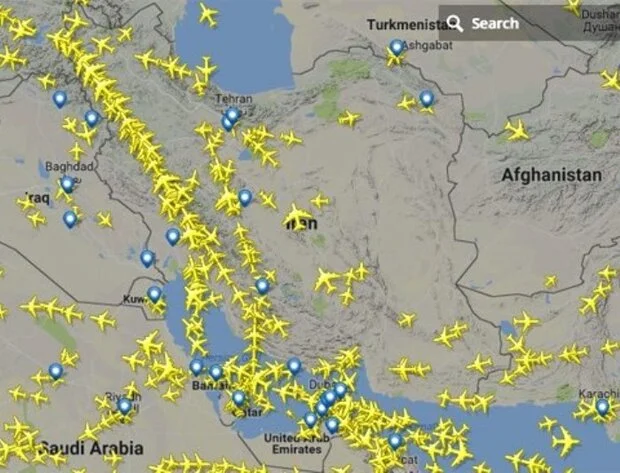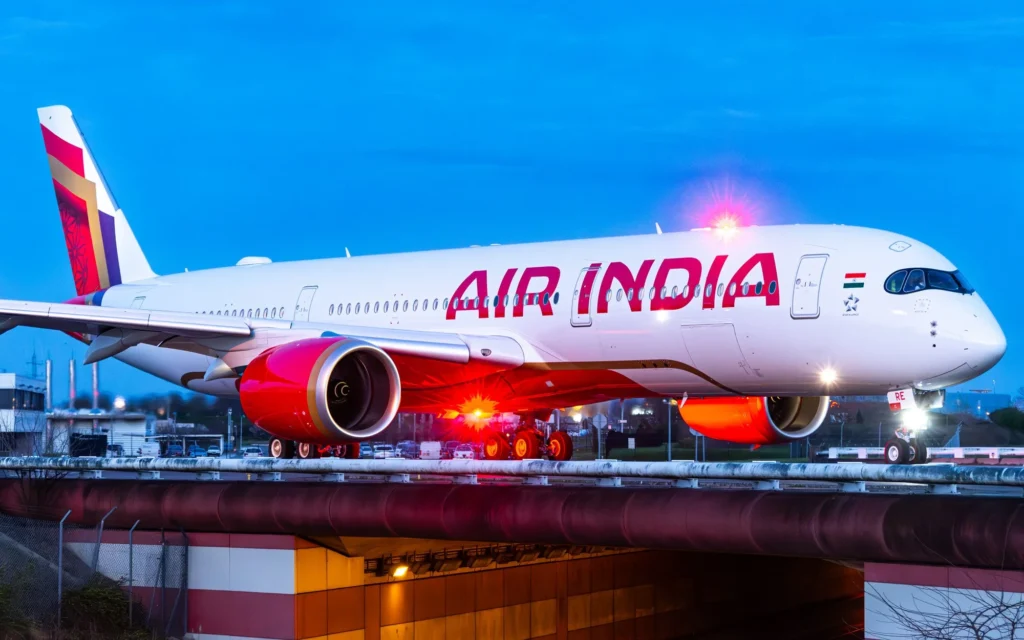On April 22, 2025, an incident involving the Indian Prime Minister Narendra Modi’s aircraft, ‘India One,’ passing through Pakistan’s airspace initially seemed like a routine diplomatic event. However, the same day, a deadly attack on tourists in Pahalgam, Kashmir, escalated tensions in the region. Although Modi’s aircraft initially used Pakistan’s airspace to travel from Delhi to Jeddah, it opted for a longer, costlier route over the Arabian Sea on its return journey. This shift signaled that India may no longer fully trust the regular air corridors with Pakistan.
This change wasn’t just a technical decision but a significant diplomatic message. Historically, whenever military or political tensions between India and Pakistan rise, the closure or alteration of air routes has been a direct consequence. A notable example of this occurred after the Pulwama attack in 2019, when both nations kept their airspaces closed for several months. The decision to avoid Pakistani airspace on the return leg of ‘India One’ suggested that India was reassessing its relationship with Pakistan under the current circumstances.
This move by India could signal further diplomatic fallout. In response to India’s suspension of the Indus Waters Treaty and the closure of the Atari border, Pakistan has announced the closure of its airspace to Indian airlines. As of now, India has yet to respond to this action.
According to Pakistan’s Civil Aviation Authority, Indian-registered aircraft, as well as those operated by Indian airlines or owned/leased by Indian operators, would no longer have access to Pakistani airspace. This measure also applies to military flights from India.
Following this announcement, air traffic data provided by ‘FlightRadar24’ indicated that several Indian flights were under scrutiny, particularly those heading from Delhi to Germany, Toronto to Delhi, and Kuwait to Bangalore. Two Indian flights, from Sharjah to Ahmedabad and Amritsar to Dubai, were already within Pakistani airspace at the time, but they were allowed to continue their routes.
The diplomatic crisis began with a deadly attack on tourists in Pahalgam, a popular tourist spot in Indian-administered Kashmir. Though no group claimed responsibility for the attack and the Indian government has not officially blamed Pakistan, the Kashmir Police released sketches of three alleged attackers, two of whom were reportedly Pakistani citizens. Indian authorities have not provided concrete evidence, while Islamabad has firmly denied all such allegations.
This situation highlights the complexities of India and Pakistan’s relationship. While Pakistan depends on India for the fair distribution of water as per the Indus Waters Treaty, India relies on Pakistan’s airspace for numerous international flights. Many of India’s flights to Europe, North America, and the Middle East typically traverse Pakistani airspace.
Overflight Fees and Air Traffic Revenue

Countries charge airlines for using their airspace through a fee known as the “overflight fee.” Just as any country has territorial rights over its land, it also possesses ownership over its airspace. Most countries rent out their airspace to foreign airlines, allowing them to use it for their flights.
In addition to the basic rent, some countries, including Pakistan, also provide air traffic control services, for which a portion of the overflight fee is charged. For Pakistan, these fees constitute a source of revenue. The Civil Aviation Authority of Pakistan calculates overflight fees based on the weight of the aircraft and the distance covered within Pakistani airspace.
To avoid paying such fees, some airlines opt for longer routes. However, avoiding a country’s airspace is not always easy, as its airspace may extend over vast areas, much larger than the country’s landmass. For instance, although the United States’ airspace extends as far as the Philippines, flying over the sea instead of land may be less expensive. However, despite the potential savings, some airlines still have to pay for flying through U.S. airspace, even if their flights are only traveling from Australia to Japan.
For flights departing from India to Central and Western Asia, Europe, the United Kingdom, and the United States, the usual route typically involves passing through Pakistani airspace. Should Indian airlines be forced to take alternative routes, their costs—especially fuel expenses—are expected to rise significantly.
Impact on Indian Airlines

The closure of Pakistani airspace has significant implications for Indian airlines, particularly Air India, which operates many flights over the region. Air India, the largest airline in India’s Western airspace, has acknowledged the increased costs and operational challenges resulting from the Pakistani airspace closure. The airline confirmed that passengers traveling between North America, the UK, Europe, and the Middle East would have to take longer, more expensive routes.
Air India has expressed regret over the inconvenience caused to its customers by the closure of Pakistan’s airspace, explaining that the decision was beyond their control. Similarly, budget airline Indigo reported that several of its international flights had been disrupted by the sudden closure of Pakistani airspace.
Aviation service provider ‘Serium’ informed Indian news outlet Live Mint that Air India and Delhi Airport would bear the brunt of this disruption. According to Serium’s data, Air India operates 134 weekly flights to Europe and North America from Delhi, which rely on Pakistani airspace. Additionally, Delhi Airport sees 144 weekly flights to Saudi Arabia, the UAE, Oman, Kuwait, Qatar, and Bahrain that also use Pakistan’s airspace.
In total, around 300 flights per week from Delhi Airport are likely to be impacted by the airspace closure, leading to increased costs, delays, and changes in flight schedules. It’s important to note that Pakistan has only closed its airspace to Indian airlines, so international carriers are still permitted to fly through Pakistani airspace.
Financial Impact on Air India and Other Airlines

The closure of Pakistan’s airspace is a blow to Indian airlines, especially in terms of operational efficiency and increased expenses. In 2019, when Pakistan closed its airspace for over five months, Indian airlines such as Air India, SpiceJet, Indigo, and GoAir suffered significant financial losses. During this period, several flights were canceled, and alternative routes had to be used, resulting in higher operational costs.
At that time, Indian Minister for Civil Aviation Hardeep Singh Puri informed the Parliament that Indian airlines lost a combined total of $8 million due to the closure of Pakistani airspace. Specifically, Air India lost ₹491 crore (approximately $66 million), Indigo ₹25.1 crore ($3.4 million), SpiceJet ₹30.73 crore ($4.2 million), and GoAir ₹2.1 crore ($0.3 million).
Moreover, this disruption led to increased flight durations, higher ticket prices, and additional burdens on air traffic controllers. Even international airlines were affected. For instance, United Airlines, an American carrier, suspended flights between the United States and India due to the airspace restrictions.
While the closure of Pakistani airspace caused significant losses to Indian airlines, it also affected Pakistan’s aviation industry. From February to July 2019, Pakistan’s Civil Aviation Authority reported a loss of ₹8.5 billion ($5 million) due to the airspace closure. Despite this, Pakistani officials argued that India suffered a far greater financial blow.
The re-opening of Pakistani airspace in July 2019 was seen as a relief for Indian airlines. Air India, for instance, reported significant savings in time and fuel costs. With the reopening, the flight duration from India to Europe and the United States was reduced by 1.5 to 2 hours, leading to a reduction in fuel consumption and overall costs.
The closure of Pakistani airspace to Indian airlines could result in significant operational and financial challenges for the latter, particularly Air India. The increased fuel costs, delays, and disrupted flight schedules are expected to affect hundreds of flights per week, particularly those departing from Delhi Airport. The long-term impact could be felt in rising ticket prices and a reduction in overall travel efficiency between India and several international destinations.
In addition to the direct financial implications, this move underscores the ongoing political and diplomatic tensions between India and Pakistan. As the two countries continue to navigate their complex relationship, the closure of airspace serves as a reminder of how air travel, like other aspects of international relations, can be impacted by geopolitical events.
BY Naimat Ullah







